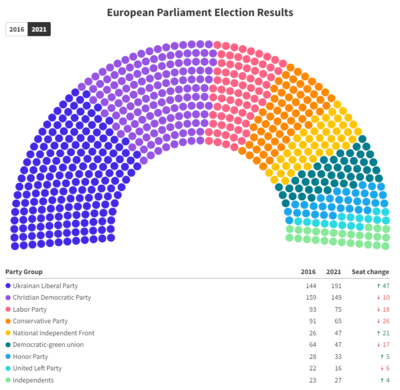Rus of Ukraine Elections 2021
| |||||||||||||||||||||||||||||||||||||||||||||||||||||||||||||||||||||||||||||||||||||||||||||||||||||||||||||||||||||||||||||||||
All 650 seats to the Verkhovna Rada of Rus Ukraine 326 seats needed for a majority | |||||||||||||||||||||||||||||||||||||||||||||||||||||||||||||||||||||||||||||||||||||||||||||||||||||||||||||||||||||||||||||||||
|---|---|---|---|---|---|---|---|---|---|---|---|---|---|---|---|---|---|---|---|---|---|---|---|---|---|---|---|---|---|---|---|---|---|---|---|---|---|---|---|---|---|---|---|---|---|---|---|---|---|---|---|---|---|---|---|---|---|---|---|---|---|---|---|---|---|---|---|---|---|---|---|---|---|---|---|---|---|---|---|---|---|---|---|---|---|---|---|---|---|---|---|---|---|---|---|---|---|---|---|---|---|---|---|---|---|---|---|---|---|---|---|---|---|---|---|---|---|---|---|---|---|---|---|---|---|---|---|---|---|
| Turnout | 38,763,877 (89.73% | ||||||||||||||||||||||||||||||||||||||||||||||||||||||||||||||||||||||||||||||||||||||||||||||||||||||||||||||||||||||||||||||||
| |||||||||||||||||||||||||||||||||||||||||||||||||||||||||||||||||||||||||||||||||||||||||||||||||||||||||||||||||||||||||||||||||
 Post-election composition of the Verkhovna Rada | |||||||||||||||||||||||||||||||||||||||||||||||||||||||||||||||||||||||||||||||||||||||||||||||||||||||||||||||||||||||||||||||||
| |||||||||||||||||||||||||||||||||||||||||||||||||||||||||||||||||||||||||||||||||||||||||||||||||||||||||||||||||||||||||||||||||
The 2021 Verkhovna Rada election took place from 20 to 21 March. It was the 26th election of the Verkhovna Rada since the Independence of Rus of Ukraine in 1919. The election was won by the Ukrainian Liberal Party and with the support of the Conservatives, the NIF and the independents, with the votes of Honors Party they managed to establish a government, with Anatoly Kravchuk as president.
Background
The elections of April 23 and 24, 2016 had the Christian Democratic Party led by Olena Fidorova as the winner. However, they had to put together a coalition government with the Labor party, Democratic-green Union and United left party. They reached a majority of votes of 338 for the investiture debate, which allowed the Christian democratic party to take power, although with various concessions to the other parties, especially the left-wing United party.
Olena Fidorova, the newly appointed Prime Minister, played a crucial role in mediating between the diverse interests of the coalition members. Her leadership style, characterized by diplomacy and inclusivity, was instrumental in keeping the coalition intact during the early days of governance. One of the first major legislative acts passed by the new government was a comprehensive healthcare reform bill, which aimed to provide universal healthcare coverage and reduce medical costs for citizens. This bill was seen as a significant victory for the Labor Party and the United Left Party. Despite initial successes, the coalition government encountered opposition from the conservative factions within the parliament, who criticized the increased government spending and perceived left-leaning policies. The Christian Democratic Party had to constantly negotiate and compromise to push through its agenda, leading to a slow but steady pace of legislative achievements.
By the time the 2021 elections approached, the Liberal Party had gained significant momentum. They campaigned on a platform of fiscal responsibility, transparency, and moderate social reforms, which resonated with a public weary of the coalition's internal conflicts and perceived inefficiencies. On election day, the Liberal Party emerged victorious, securing a clear majority in the parliament.
Electoral System
Elections are conducted by direct universal suffrage by proportional representation using either a list system or single transferable vote. The d'Hondt method of representation is used to seek greater participation of parties in the Verkhovna Rada. Each of the 25 regions and the two cities with special status of Rus of Ukraine have representatives of the different parties who are elected by semi-open or open lists (depending on the regulations of the regions) and through proportionality, they reach the Verkhovna Rada.
Candidates are placed on regional lists by their respective parties, and voters can either vote for a party list as a whole or for individual candidates within a list, depending on the system adopted by the region. This hybrid approach aims to balance party control with voter influence, ensuring that popular candidates can still secure seats even if their party does not dominate the list.
To be eligible for representation, parties must surpass a 2% electoral threshold at the national level, which helps to prevent fragmentation in the parliament and encourages the formation of broader coalitions. The allocation of seats within the Verkhovna Rada follows the d'Hondt method, which tends to favor larger parties but still allows for smaller parties to gain representation if they have sufficient support.
Election campaigns are regulated to ensure fairness, with strict rules on campaign financing, media access, and political advertising. The Central Election Commission oversees the electoral process, ensuring that it is conducted transparently and in accordance with the law. International observers are often invited to monitor elections, adding an extra layer of scrutiny to uphold the integrity of the electoral system.
Overall, the electoral system is designed to create a representative and inclusive legislative body, reflecting the diverse political landscape of Rus of Ukraine while maintaining stability and effective governance.
Lead Candidates
Overview of party candidates for Commission President in 2024
| European political party | VR Group | Lead candidate(s) | ||
|---|---|---|---|---|
| ULP | Ukrainian Liberal Party | ALDE | Anatoly Kravchuk | |
| CDP | Christian Democratic Party | S&D | Nicolas Schmit | |
| LP | Labor party | Renew | Marie-Agnes Strack-Zimmermann | |
| CP | Conservative Party | Alde | Sandro Gozi | |
| NIF | National Independent Front | Greens/EFA | Bas Eickhout, Terry Reintke | |
| DGU | Democratic-green Union | Greens/EFA, ECR | Maylis Roßberg, Raül Romeva | |
| HP | Honor Party | ID | Anatloy | |
| ULP | United Left Party | ECR | Frances | |
| IND | Independents | The Left | Walter Baier | |








